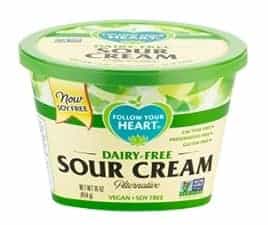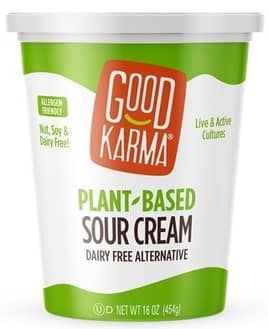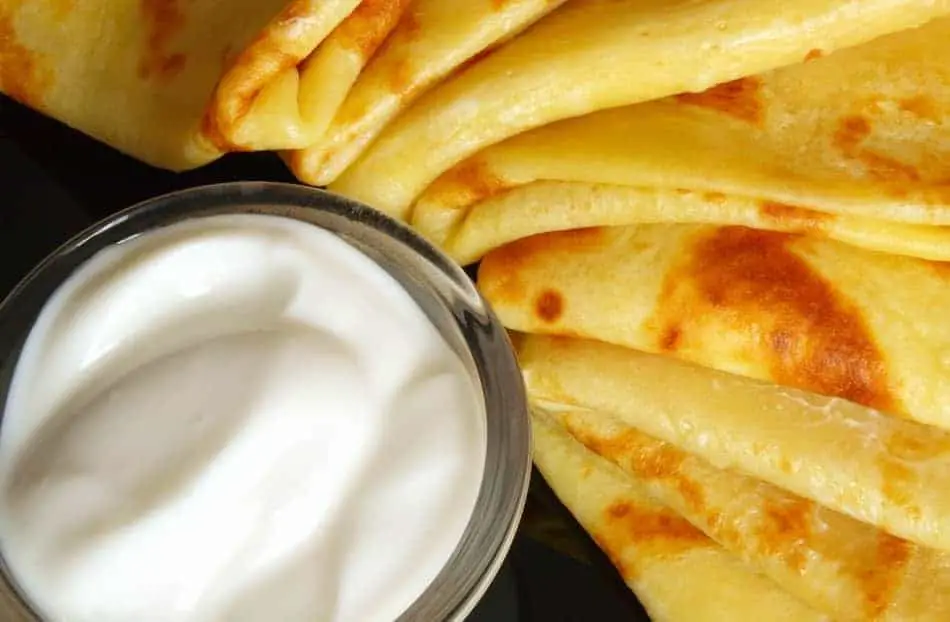Sour cream (North American) or soured cream (British) is a food product produced by fermentation of regular cream with certain types of lactic acid-producing bacteria.1
I get asked quite a bit whether sour cream is suitable for vegans, usually from two types of readers: those who are new to the subject of vegan diets and aren’t yet quite sure what the eating pattern includes/omits and those who are familiar with the vegan diet, but aren’t sure what sour cream actually is.
Is it vegan? No, real sour cream is never considered vegan. It’s a dairy product, which means it’s off-limits for vegans. Perhaps one day there will be lab-cultivated dairy, but as for now, all dairy products are derived from mammals.
To address the two reasons mentioned above (as far as why folks wonder if sour cream is vegan), we’ll go over the ways in which sour cream does not qualify as a vegan food product.
Why Sour Cream Isn’t Vegan
Sour Cream Is Derived from Milk
For those who are unsure of what sour cream actually is, it’s a cultured milk product. The bacterial culture is introduced naturally or deliberately, at which point it sours and then thickens the cream content of the milk.
The “sour” in sour cream comes from the production of lactic acid by fermentation of LA-producing bacteria, a process known as souring.
Fermented or cultured milk products have been used for centuries, and are thought to offer several health benefits.2
Cultured milk products commonly consumed in North America include sour cream as well as yogurt, buttermilk, acidophilus milk, and kefir.
The one trait they all have in common is that they’ve had bacterial cultures added to them to convert lactose (the simple sugar present in milk) into lactic acid.
The increased concentration of acid causes the casein protein (the most abundant protein in milk) to precipitate out, causing the milk to take on a more curd-like consistency.
The flavor of the resultant product is largely determined by the type of bacterial culture used for the souring process. The type of bacteria also influences the acids that are produced and the quality of the resulting product.
Some of the milk protein is broken down in the process to provide the nitrogen needed for bacterial growth, and the breakdown of the protein also makes the curds softer and more easily digested.3
Sour cream tends to be soured by Streptococcus lactis bacteria, though other acidifying agents can be used.
Half-and-half or light cream is fermented at 72°F (22°C) until the acidity (from lactic acid) reaches about 0.5%.
Thicker sour creams are produced if MSNF (milk solids non-fat) are added, though vegetable gums such as carrageenan, and certain enzymes are often added to help achieve a thicker consistency.
Though there are vegan-friendly alternatives on the market, just keep in mind that true sour cream is always considered a milk product.
In fact, to be labeled as “sour cream,” a minimum of 18% milkfat has to be used—at least starting out, because sweeteners are often added, which allows the minimum milk fat content to be as low as 14.4%.4
Milk Is an Animal Product and Thus Non-Vegan
There’s a bit of confusion around what the vegan diet actually is. Some folks assume it’s strictly a health thing, and that vegans probably just try to avoid overly processed foods. Human health is definitely a concern in the vegan community, and those who identify as “vegan for health reasons” are often much less concerned with the ethical implications of eating animal products.
These folks do often go in for organic and natural products. For this reason, it’s quite understandable that some onlookers may assume that a “health vegan” would be okay with consuming, say, organic/unpasteurized cows milk. After all, many self-proclaimed vegans do consume yard eggs (eggs laid by yard hens that are raised in humane ways).
But, it’s important to keep in mind that, what separates vegans from lacto-ovo vegetarians, is a strict abstinence from eggs and milk. If you consume eggs or milk, you are a lacto-ovo vegetarian—or a lacto-vegetarian or ovo-vegetarian if you just consume milk or eggs, respectively.
If you find the distinctions confusing, I wrote an entire article dedicated to the various types of plant-based diets you can check out here. If you don’t want to read the whole article, there’s a handy chart that differentiates the eating patterns per what they include/exclude.
Anyway, because sour cream is derived from milk, and milk is derived from cows, real sour cream is always a no-go for vegans, regardless of whether the sour cream was sourced from organic milk or milk from cows that are raised humanely.
Vegans abstain from dairy products for a wide range of reasons, including:
- Health reasons. Milk has several components largely thought to be unhealthy.
- Ethical reasons. Those pertaining to the treatment of non-human animals.
- Environmental reasons. Animal agriculture, especially the wide-scale factory farming of cattle, has a number of negative effects on the environment, as cattle emit large quantities of the greenhouse gas methane which contributes directly to climate change.
If you’re thinking about becoming vegan for health reasons, just know that milk is a significant source of saturated fat and cholesterol in the human diet. It’s also associated with higher levels of IGF-1 and insulin, both of which are implicated in the etiology of many cancers.5
Dairy is a source of exogenous hormones, the consumption of which is linked to cancers of the breast and prostate.6
Vegan Sour Cream Alternatives
So, as mentioned above, there are sour cream substitutes on the market. Sour cream substitutes aren’t always vegan, as several were available prior to the advent of specialty vegan (non-dairy) milk products.
I.e. cream substitutes, in general, are not always dairy-free.
For example, some of the whipped toppings you’ll encounter in pressurized cans and tubs, as well as certain dry mixes, coffee creamers, snack dips, and imitation sour cream, are made from largely non-dairy ingredients but may contain milk-derived additives, or even egg.
Cream substitutes first came into being to serve as low-cost substitutes that would have a longer shelf-life.
A lot of largely non-dairy creams were initially created as low-fat cream substitutes.They usually contain some saturated fat, but a lot of the lighter substitutes have as few as half the calories and one-third the fat of the creams they were created to replace, and many contain no cholesterol.
Some fall far short of being completely dairy-free. In fact, many are actually made from milk protein processed into small, spherical globules.7
Ingredients commonly present in pressurized cans of cream substitutes include vegetable oil, corn syrup solids, soy protein, sodium caseinate, vegetable gums, emulsifiers, whiteners, and artificial flavors and colors.8
So, they’re often a mix of vegan-friendly and non-vegan ingredients.
But, that having been said, there are several vegan-friendly sour cream alternatives on the market these days, and many are so authentic that they’re hard to differentiate from the real thing.
Follow Your Heart Dairy-Free Sour Cream

Ingredients include:9
- Filtered Water
- Coconut Cream
- Expeller-Pressed High-Oleic Safflower Oil
- Organic Coconut Oil
- Organic Tapioca Maltodextrin
- Tapioca Starch
- Pectin
- Natural Flavors (Plant Sources)
- Glucono Delta Lactone (Plant Source)
- Gellan Gum
- Organic Lemon Juice Concentrate
- Calcium Phosphate
- Locust Bean Gum
- Lactic Acid (Plant Source)
- Calcium Lactate (Plant Source)
- Guar Gum
- Sea Salt
- Sodium Alginate
Good Karma Sour Cream

Ingredients for this product include:10
- Water
- Coconut Oil
- Tapioca Flour
- Pea Protein
- Dextrose
- Corn Starch (Unmodified, Identity Preserved)
- Tricalcium Phosphate
- Sea Salt
- Sunflower Lecithin
- Lactic Acid (Vegan)
- Natural Flavor
- Vitamin A Palmitate
- Vitamin D2
- Vitamin B12
- Live and Active Cultures
That’s it for the vegan status of sour cream. Thanks for reading.
You may also want to check out the following articles:
- Is Yogurt Vegan? (Regular, Greek, Flavored, Plain, Etc.)
- Is Ranch Vegan?
- Is White Chocolate Vegan? (How to Know for Sure)
- Is Soy Vegan? (Soy, Tofu, Soy Milk, Miso, Etc.)
References
- “What is sour cream. Sour cream for cooking recipes”. Homecooking.about.com. 2010-06-14. https://www.thespruceeats.com/what-is-sour-cream-1808232
- Fiander A, et al. Effects of lactic acid bacteria and fermented milks on eicosanoid production by intestinal epithelial cells. Journal of Food Science 70(2):M81–M86, 2005.
- Understanding Food: Principles and Preparation (Page 221). Amy Brown – Wadsworth Cengage Learning – 2011
- Understanding Food: Principles and Preparation (Page 223). Amy Brown – Wadsworth Cengage Learning – 2011
- Giovannucci, E. Insulin-like growth factor-I and binding protein-3 and risk of cancer. Horm Res., 51 Suppl 3:34-41, 1999. https://www.ncbi.nlm.nih.gov/pubmed/10592442
- Liehr, J.G. Is estradiol a genotoxic mutagenic carcinogen? Endocr. Rev., 21(1):40- 54, Feb 2000. https://www.ncbi.nlm.nih.gov/pubmed/10696569
- Dairy ingredient replaces fat, adds flavor. Food Engineering 64(1):26, 1992.
- Understanding Food: Principles and Preparation (Page 224). Amy Brown – Wadsworth Cengage Learning – 2011
- Sour Cream. https://followyourheart.com/products/sour-cream/
- Good Karma Plant-based Sour Cream Review (dairy-free). https://www.godairyfree.org/product-reviews/good-karma-plant-based-sour-cream

